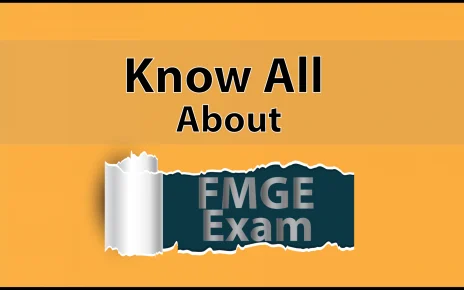What is FMGE?
FMGE, or the Foreign Medical Graduate Examination, is a licensing exam conducted by the National Board of Examinations in Medical Sciences (NBEMS). This exam is specifically designed for Indian citizens or Overseas Citizens of India (OCIs) who have obtained their medical degrees from institutions outside India. Conducted twice a year, typically in June and December, FMGE is a mandatory step for candidates aiming to gain provisional or permanent registration with the Medical Council of India (MCI) or a State Medical Council (SMC), allowing them to practice medicine in India.
FMGE 2025: Eligibility Criteria
The NBEMS establishes the eligibility criteria for FMGE 2025, applicable to both Indian nationals and OCIs. Candidates must meet specific requirements concerning nationality, qualifications, and documentation to sit for the exam. Failure to fulfill these criteria results in disqualification. Here’s a detailed look at the eligibility criteria:
- Nationality: Candidates must be Indian citizens or OCIs.
- Medical Qualification: Aspirants must hold a primary medical qualification from a recognized institution, which must also be verified by the respective Indian Embassy in the country of study.
- Completion Proof: Candidates need to submit documents proving successful completion of their primary medical course and qualification on or before the specified date.
- Exemption: Graduates from certain countries are exempt from FMGE and can directly apply for registration with the MCI or SMC to practice in India.
Countries Exempted from FMGE:
- Australia
- Canada
- New Zealand
- United States of America
- United Kingdom
Documents Required for FMGE
NBEMS may request additional documents if any doubts arise regarding a candidate’s eligibility for FMGE. Below is a list of commonly required documents:
- Address Proof: PAN card, voter ID, passport, driving license, or Aadhaar card.
- Passport-Sized Photographs: Recent photographs meeting the specified guidelines.
- Date of Birth Proof: Matriculation certificate or equivalent.
- 10+2 Certificate and Mark Sheet: Copies of certificates and mark sheets.
- Internship Certificate: If the internship was completed abroad.
- Fail Certificate: Applicable for ex-candidates.
- Category Proof: SC, ST, or OBC certificate if applicable.
- Equivalence Certificate: Issued by the Association of Indian Universities for candidates who completed 10+2 abroad.
How to Approach FMGE After Failing?
If you have failed FMGE, don’t be disheartened. Here are some top strategies to help you clear this challenging exam:
- Analyze Past Mistakes: Review your previous performance to identify weak areas and focus on improving them.
- Structured Study Plan: Create a realistic and focused timetable covering all important topics.
- Refer to Trusted Study Materials: Use resources like previous years’ question papers, standard textbooks, and online coaching materials.
- Mock Tests and Practice: Regularly attempt mock exams to familiarize yourself with the pattern and manage time effectively.
- Join Coaching Programs: Enroll in specialized FMGE courses like StudyFMGE for expert guidance and support.
- Stay Consistent and Motivated: Avoid burnout by balancing study time with relaxation and maintaining a positive mindset.
We hope this comprehensive guide helps you navigate the FMGE process and prepare effectively. For further assistance or personalized support with FMGE exam preparation, connect with the StudyFMGE team today. Wishing you success in your journey!




